Abstract
Pentoxifylline (PTX) has been shown to increase radiation damage to tumours and to decrease late radiation-induced injury to normal tissues. This tumour radiation sensitisation results from increased oxygen supply via improved tumour perfusion. We propose that the improved perfusion results from decreased viscous resistance and/or geometric resistance. The decreased flow resistance may be accompanied by a reduction in microvascular pressure (MVP). Since MVP is approximately equal to the interstitial fluid pressure (IFP), PTX should lead to a decrease in IFP. To test this hypothesis, we measured PO2, laser Doppler flow (RBC flux) and IFP in FSaII murine tumours at two doses (PTX at 25 and 100 mg per kg body weight) which sensitise this tumour to X-irradiation. We found that 25 mg kg-1 PTX was ineffective, but 100 mg kg-1 PTX was effective in increasing the PO2 of this tumour. PTX at 100 mg kg-1 (i.p.) increased median PO2 from 5 to 7 mmHg (P < 0.05) within 2 h, and decreased the fraction of PO2 values < 5 mmHg from 65% to 45% (P < 0.05). In support of our hypothesis, we found that with this dose of PTX, RBC flux in the tumour centre increased significantly (n = 6, P < 0.05) prior to an approximately 40% decrease (n = 13, P < 0.05) in tumour interstitial fluid pressure (TIFP), without changes in mean arterial blood pressure (MABP). In conclusion, a single i.p. administration of PTX at 100 mg kg-1 can increase oxygen availability in the tumour due to ameliorate hypoxia in tumour microregions. Second, PTX can lower the elevated TIFP without lowering the MABP.
Full text
PDF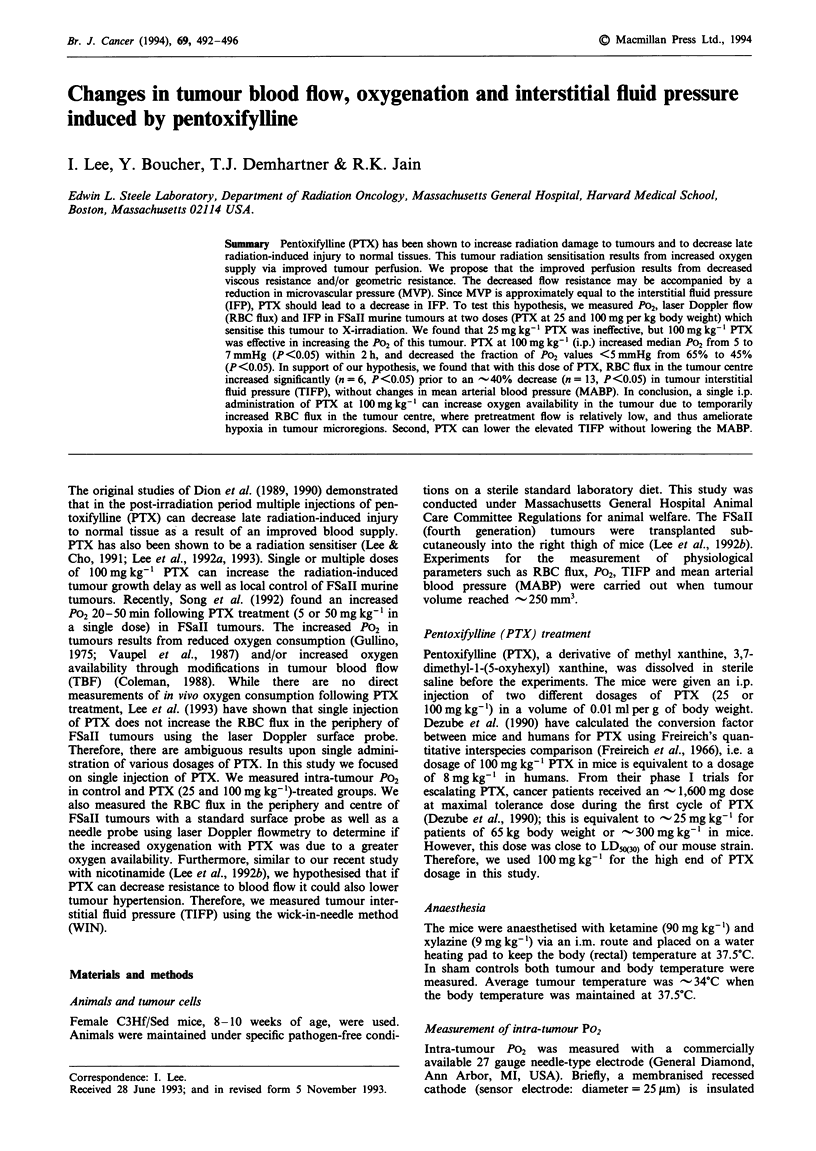
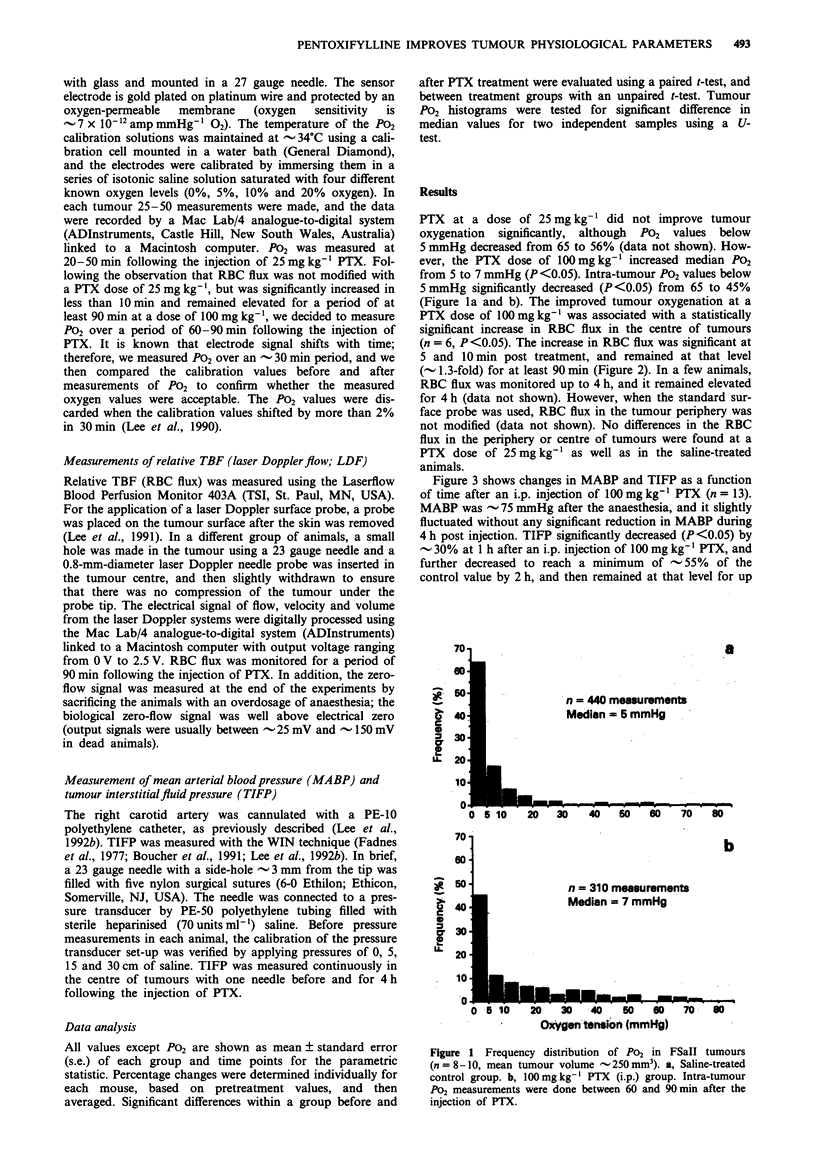
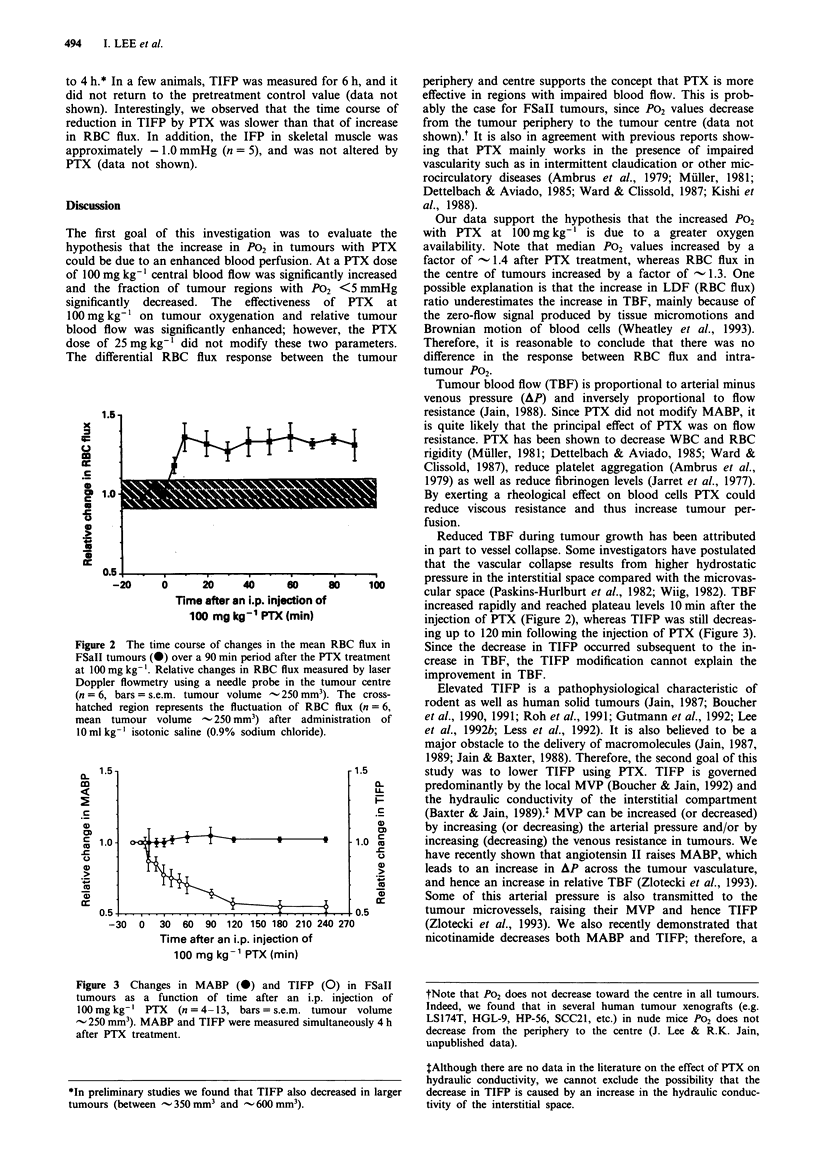
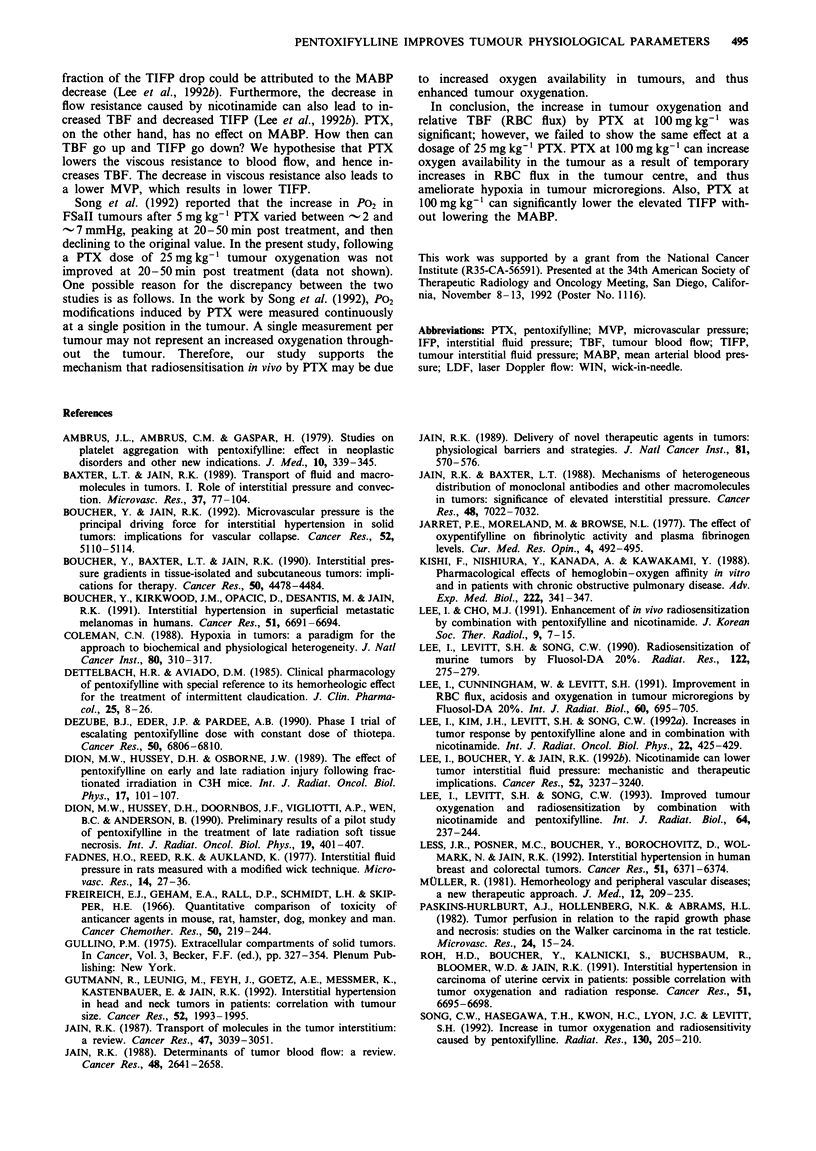
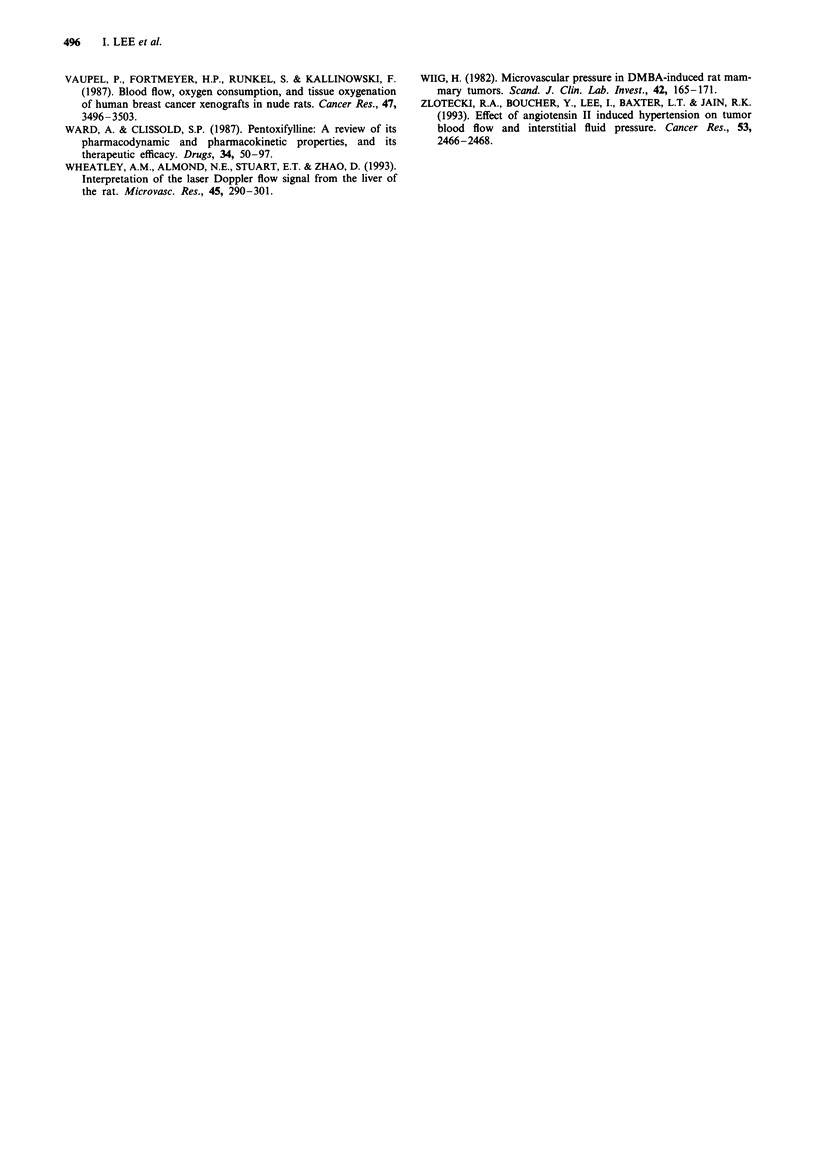
Selected References
These references are in PubMed. This may not be the complete list of references from this article.
- Ambrus J. L., Ambrus C. M., Gastpar H. Studies on platelet aggregation with pentoxifylline: effect on neoplastic disorders and other new indications. J Med. 1979;10(5):339–345. [PubMed] [Google Scholar]
- Baxter L. T., Jain R. K. Transport of fluid and macromolecules in tumors. I. Role of interstitial pressure and convection. Microvasc Res. 1989 Jan;37(1):77–104. doi: 10.1016/0026-2862(89)90074-5. [DOI] [PubMed] [Google Scholar]
- Boucher Y., Baxter L. T., Jain R. K. Interstitial pressure gradients in tissue-isolated and subcutaneous tumors: implications for therapy. Cancer Res. 1990 Aug 1;50(15):4478–4484. [PubMed] [Google Scholar]
- Boucher Y., Jain R. K. Microvascular pressure is the principal driving force for interstitial hypertension in solid tumors: implications for vascular collapse. Cancer Res. 1992 Sep 15;52(18):5110–5114. [PubMed] [Google Scholar]
- Boucher Y., Kirkwood J. M., Opacic D., Desantis M., Jain R. K. Interstitial hypertension in superficial metastatic melanomas in humans. Cancer Res. 1991 Dec 15;51(24):6691–6694. [PubMed] [Google Scholar]
- Coleman C. N. Hypoxia in tumors: a paradigm for the approach to biochemical and physiologic heterogeneity. J Natl Cancer Inst. 1988 May 4;80(5):310–317. doi: 10.1093/jnci/80.5.310. [DOI] [PubMed] [Google Scholar]
- Dettelbach H. R., Aviado D. M. Clinical pharmacology of pentoxifylline with special reference to its hemorrheologic effect for the treatment of intermittent claudication. J Clin Pharmacol. 1985 Jan-Feb;25(1):8–26. doi: 10.1002/j.1552-4604.1985.tb02796.x. [DOI] [PubMed] [Google Scholar]
- Dezube B. J., Eder J. P., Pardee A. B. Phase I trial of escalating pentoxifylline dose with constant dose thiotepa. Cancer Res. 1990 Nov 1;50(21):6806–6810. [PubMed] [Google Scholar]
- Dion M. W., Hussey D. H., Doornbos J. F., Vigliotti A. P., Wen B. C., Anderson B. Preliminary results of a pilot study of pentoxifylline in the treatment of late radiation soft tissue necrosis. Int J Radiat Oncol Biol Phys. 1990 Aug;19(2):401–407. doi: 10.1016/0360-3016(90)90549-y. [DOI] [PubMed] [Google Scholar]
- Dion M. W., Hussey D. H., Osborne J. W. The effect of pentoxifylline on early and late radiation injury following fractionated irradiation in C3H mice. Int J Radiat Oncol Biol Phys. 1989 Jul;17(1):101–107. doi: 10.1016/0360-3016(89)90376-3. [DOI] [PubMed] [Google Scholar]
- Fadnes H. O., Reed R. K., Aukland K. Interstitial fluid pressure in rats measured with a modified wick technique. Microvasc Res. 1977 Jul;14(1):27–36. doi: 10.1016/0026-2862(77)90138-8. [DOI] [PubMed] [Google Scholar]
- Gutmann R., Leunig M., Feyh J., Goetz A. E., Messmer K., Kastenbauer E., Jain R. K. Interstitial hypertension in head and neck tumors in patients: correlation with tumor size. Cancer Res. 1992 Apr 1;52(7):1993–1995. [PubMed] [Google Scholar]
- Jain R. K., Baxter L. T. Mechanisms of heterogeneous distribution of monoclonal antibodies and other macromolecules in tumors: significance of elevated interstitial pressure. Cancer Res. 1988 Dec 15;48(24 Pt 1):7022–7032. [PubMed] [Google Scholar]
- Jain R. K. Delivery of novel therapeutic agents in tumors: physiological barriers and strategies. J Natl Cancer Inst. 1989 Apr 19;81(8):570–576. doi: 10.1093/jnci/81.8.570. [DOI] [PubMed] [Google Scholar]
- Jain R. K. Determinants of tumor blood flow: a review. Cancer Res. 1988 May 15;48(10):2641–2658. [PubMed] [Google Scholar]
- Jain R. K. Transport of molecules in the tumor interstitium: a review. Cancer Res. 1987 Jun 15;47(12):3039–3051. [PubMed] [Google Scholar]
- Jarret P. E., Moreland M., Browse N. L. The effect of oxpentifylline ('Trental') on fibrinolytic activity and plasma fibrinogen levels. Curr Med Res Opin. 1977;4(7):492–495. doi: 10.1185/03007997709109338. [DOI] [PubMed] [Google Scholar]
- Kishi F., Nishiura Y., Kamada A., Kawakami Y. Pharmacological effects on hemoglobin-oxygen affinity in vitro and in patients with chronic obstructive pulmonary disease. Adv Exp Med Biol. 1988;222:341–347. doi: 10.1007/978-1-4615-9510-6_40. [DOI] [PubMed] [Google Scholar]
- Lee I., Boucher Y., Jain R. K. Nicotinamide can lower tumor interstitial fluid pressure: mechanistic and therapeutic implications. Cancer Res. 1992 Jun 1;52(11):3237–3240. [PubMed] [Google Scholar]
- Lee I., Cunningham W. P., Levitt S. H. Improvement in RBC flux, acidosis and oxygenation in tumour microregions by Fluosol-DA 20%. Int J Radiat Biol. 1991 Oct;60(4):695–705. doi: 10.1080/09553009114552501. [DOI] [PubMed] [Google Scholar]
- Lee I., Kim J. H., Levitt S. H., Song C. W. Increases in tumor response by pentoxifylline alone or in combination with nicotinamide. Int J Radiat Oncol Biol Phys. 1992;22(3):425–429. doi: 10.1016/0360-3016(92)90846-a. [DOI] [PubMed] [Google Scholar]
- Lee I., Levitt S. H., Song C. W. Improved tumour oxygenation and radiosensitization by combination with nicotinamide and pentoxifylline. Int J Radiat Biol. 1993 Aug;64(2):237–244. doi: 10.1080/09553009314551351. [DOI] [PubMed] [Google Scholar]
- Lee I., Levitt S. H., Song C. W. Radiosensitization of murine tumors by Fluosol-DA 20%. Radiat Res. 1990 Jun;122(3):275–279. [PubMed] [Google Scholar]
- Less J. R., Posner M. C., Boucher Y., Borochovitz D., Wolmark N., Jain R. K. Interstitial hypertension in human breast and colorectal tumors. Cancer Res. 1992 Nov 15;52(22):6371–6374. [PubMed] [Google Scholar]
- Müller R. Hemorheology and peripheral vascular diseases: a new therapeutic approach. J Med. 1981;12(4):209–235. [PubMed] [Google Scholar]
- Paskins-Hurlburt A. J., Hollenberg N. K., Abrams H. L. Tumor perfusion in relation to the rapid growth phase and necrosis: studies on the Walker carcinoma in the rat testicle. Microvasc Res. 1982 Jul;24(1):15–24. doi: 10.1016/0026-2862(82)90038-3. [DOI] [PubMed] [Google Scholar]
- Roh H. D., Boucher Y., Kalnicki S., Buchsbaum R., Bloomer W. D., Jain R. K. Interstitial hypertension in carcinoma of uterine cervix in patients: possible correlation with tumor oxygenation and radiation response. Cancer Res. 1991 Dec 15;51(24):6695–6698. [PubMed] [Google Scholar]
- Song C. W., Hasegawa T., Kwon H. C., Lyons J. C., Levitt S. H. Increase in tumor oxygenation and radiosensitivity caused by pentoxifylline. Radiat Res. 1992 May;130(2):205–210. [PubMed] [Google Scholar]
- Vaupel P., Fortmeyer H. P., Runkel S., Kallinowski F. Blood flow, oxygen consumption, and tissue oxygenation of human breast cancer xenografts in nude rats. Cancer Res. 1987 Jul 1;47(13):3496–3503. [PubMed] [Google Scholar]
- Ward A., Clissold S. P. Pentoxifylline. A review of its pharmacodynamic and pharmacokinetic properties, and its therapeutic efficacy. Drugs. 1987 Jul;34(1):50–97. doi: 10.2165/00003495-198734010-00003. [DOI] [PubMed] [Google Scholar]
- Wheatley A. M., Almond N. E., Stuart E. T., Zhao D. Interpretation of the laser Doppler flow signal from the liver of the rat. Microvasc Res. 1993 May;45(3):290–301. doi: 10.1006/mvre.1993.1025. [DOI] [PubMed] [Google Scholar]
- Wiig H. Microvascular pressures in DMBA-induced rat mammary tumours. Scand J Clin Lab Invest. 1982 Apr;42(2):165–171. [PubMed] [Google Scholar]
- Zlotecki R. A., Boucher Y., Lee I., Baxter L. T., Jain R. K. Effect of angiotensin II induced hypertension on tumor blood flow and interstitial fluid pressure. Cancer Res. 1993 Jun 1;53(11):2466–2468. [PubMed] [Google Scholar]


